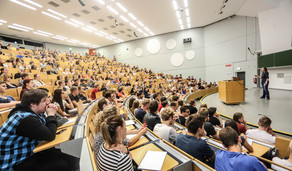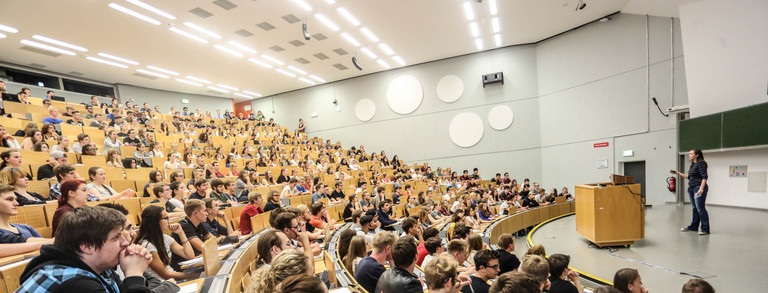AI Colloquium
The AI Colloquium is a series of lectures dedicated to cutting-edge research in the field of machine learning and artificial intelligence, coorganized by the Lamarr Institute for Machine Learning and Artificial Intelligence (Lamarr Institute), the Research Center Trustworthy Data Science and Security (RC Trust), and the Center for Data Science & Simulation at TU Dortmund University (DoDas).
Programme
Distinguished researchers deliver captivating lectures followed by vibrant discussions. However, unlike traditional colloquia, the AI Colloquium prioritizes interactive dialogue, fostering international collaboration. Conducted primarily in English, these 90-minute sessions feature hour-long lectures and 30-minute Q&A sessions. Join every Thursday at 10 AM c.t. for a stimulating exploration of cutting-edge topics. Whether in-person at our Lecture Room on Fraunhofer Strasse 25 or via Zoom, our hybrid format ensures accessibility for all.
| Day (usually) | Thursday |
| Start and end time | 10 AM c.t. - 12 AM |
| Duration of Presentation | 60 Minutes |
| Location (usually) | Lecture Room 303 3. Floor Fraunhofer Strasse 25 Dortmund |
Upcomming Events
Prediction of clinical images and radiotherapy dose – How certain are we?
- Physics
- Life Sciences

Abstract
In Germany, half a million cancer patients are diagnosed annually, with over 50% receiving radiotherapy. Proton therapy is an advanced form of radiotherapy that precisely targets tumors but requires high-quality imaging for accurate target definition. Magnetic resonance imaging (MRI) offers excellent soft tissue contrast, but current proton dose calculations rely on computed tomography (CT) images, necessitating both CT and MRI. This results in multiple imaging sessions, increased costs, and potential dose errors due to image registration challenges. The recent concept of MRI-only radiotherapy promises to resolve these issues, enabling radiation treatments without CT images, but requires dose calculation on MRI.
A key goal of our work is the accurate proton dose computation based on MRI data and ensuring its quality to enhance patient comfort and treatment options. The project aims to develop, integrate, and test deep learning (DL) solutions for precise MRI-only proton dose calculations in clinical settings. Special emphasis will be placed on the evaluation of dose prediction uncertainties and the demonstration of clinical feasibility.
Jun.-Prof. Dr. Armin Lühr
Biography
Armin Lühr is a medical physicist specializing in radiotherapy, particularly proton therapy. Currently a Juniorprofessor and group leader at TU Dortmund University's Department of Physics, he focuses on translating fundamental research into clinical practice and training the next generation of medical physicists. He earned his Ph.D. in Theoretical Physics from the Humboldt University of Berlin in 2010 and has since held research positions at key institutions in oncology research, including Aarhus University in Denmark, the German Cancer Consortium and the National Center for Radiation Research in Oncology in Dresden. He is internationally recognized for his expertise in the radiation effects of proton therapy, with a focus on their relative biological effectiveness (RBE) and in modeling radiation physics. His contributions to scientific literature and active participation in leading research committees drive advancements in medical physics, significantly improving therapeutic outcomes and patient care globally.

Past Events
Prediction of clinical images and radiotherapy dose – How certain are we?
- Physics
- Life Sciences

Abstract
In Germany, half a million cancer patients are diagnosed annually, with over 50% receiving radiotherapy. Proton therapy is an advanced form of radiotherapy that precisely targets tumors but requires high-quality imaging for accurate target definition. Magnetic resonance imaging (MRI) offers excellent soft tissue contrast, but current proton dose calculations rely on computed tomography (CT) images, necessitating both CT and MRI. This results in multiple imaging sessions, increased costs, and potential dose errors due to image registration challenges. The recent concept of MRI-only radiotherapy promises to resolve these issues, enabling radiation treatments without CT images, but requires dose calculation on MRI.
A key goal of our work is the accurate proton dose computation based on MRI data and ensuring its quality to enhance patient comfort and treatment options. The project aims to develop, integrate, and test deep learning (DL) solutions for precise MRI-only proton dose calculations in clinical settings. Special emphasis will be placed on the evaluation of dose prediction uncertainties and the demonstration of clinical feasibility.
Jun.-Prof. Dr. Armin Lühr
Biography
Armin Lühr is a medical physicist specializing in radiotherapy, particularly proton therapy. Currently a Juniorprofessor and group leader at TU Dortmund University's Department of Physics, he focuses on translating fundamental research into clinical practice and training the next generation of medical physicists. He earned his Ph.D. in Theoretical Physics from the Humboldt University of Berlin in 2010 and has since held research positions at key institutions in oncology research, including Aarhus University in Denmark, the German Cancer Consortium and the National Center for Radiation Research in Oncology in Dresden. He is internationally recognized for his expertise in the radiation effects of proton therapy, with a focus on their relative biological effectiveness (RBE) and in modeling radiation physics. His contributions to scientific literature and active participation in leading research committees drive advancements in medical physics, significantly improving therapeutic outcomes and patient care globally.

Prediction of clinical images and radiotherapy dose – How certain are we?
- Physics
- Life Sciences

Abstract
In Germany, half a million cancer patients are diagnosed annually, with over 50% receiving radiotherapy. Proton therapy is an advanced form of radiotherapy that precisely targets tumors but requires high-quality imaging for accurate target definition. Magnetic resonance imaging (MRI) offers excellent soft tissue contrast, but current proton dose calculations rely on computed tomography (CT) images, necessitating both CT and MRI. This results in multiple imaging sessions, increased costs, and potential dose errors due to image registration challenges. The recent concept of MRI-only radiotherapy promises to resolve these issues, enabling radiation treatments without CT images, but requires dose calculation on MRI.
A key goal of our work is the accurate proton dose computation based on MRI data and ensuring its quality to enhance patient comfort and treatment options. The project aims to develop, integrate, and test deep learning (DL) solutions for precise MRI-only proton dose calculations in clinical settings. Special emphasis will be placed on the evaluation of dose prediction uncertainties and the demonstration of clinical feasibility.
Jun.-Prof. Dr. Armin Lühr
Biography
Armin Lühr is a medical physicist specializing in radiotherapy, particularly proton therapy. Currently a Juniorprofessor and group leader at TU Dortmund University's Department of Physics, he focuses on translating fundamental research into clinical practice and training the next generation of medical physicists. He earned his Ph.D. in Theoretical Physics from the Humboldt University of Berlin in 2010 and has since held research positions at key institutions in oncology research, including Aarhus University in Denmark, the German Cancer Consortium and the National Center for Radiation Research in Oncology in Dresden. He is internationally recognized for his expertise in the radiation effects of proton therapy, with a focus on their relative biological effectiveness (RBE) and in modeling radiation physics. His contributions to scientific literature and active participation in leading research committees drive advancements in medical physics, significantly improving therapeutic outcomes and patient care globally.






